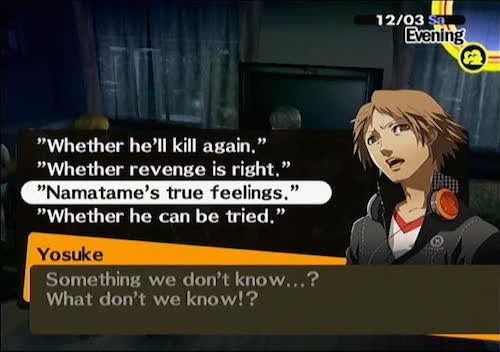231 Persona 4 Has Too Many Endings
by Foster Douglas on August 19, 2015
Player agency is a big piece of modern gaming. Being able to make decisions that matter and feeling like you are involved with the outcome are some of the most desirable qualities of games lately.
Persona 4: Golden is an example of a perfect marriage of player agency with classic linear storytelling. I could spend a dozen different posts talking about every revolutionary and perfected piece of this game; it’s not surprise that it has quickly and easily taken the spot as my favorite RPG of all time (sorry Chrono Trigger, Earthbound, and Ni No Kuni).
Last night, I made it through to the end of the game for the first time. Or, what I thought was the end of the game. Like many epic and lengthy RPGs before it, this game lets you unlock multiple different narrative endings. As exciting as this might potentially sound, it’s actually one of the worst parts of the game.
The game has what players are calling 3 “bad” endings, 1 “indifferent” ending, 1 “normal” ending, and 1 “ultimate” ending. For the purposes of this, there are 4 “false” endings and 2 “true” ones.
Finding these true endings, however, isn’t easy. Instead of the game making you feel like your choices over the course of the story make an impact at the end, it boils down which ending “path” you’re shuttled down based on a single dialogue tree.

(A minor and totally out-of-context spoiler! Sorry…)
The right thing to say here is “Namatame’s true feelings.” But, even to get to this point, the player had to successfully select 2 correct answers before this, and will need to select another 3 after. This is the way to catch the true murderer and end the story the way it was meant to be. The other outcomes end ambiguously and abruptly, and lead to a credit sequence with the most melancholy ending credit music ever written.
I think it’s a little bit ridiculous that this is the way the game wants you to experience its narrative ending. I imagine very few people (really, just statistically speaking) got these “normal” endings, and even fewer yet figured out how to get them after sitting, puzzled, through a sad credit sequence.
Maybe it’s 3 years too late (or 9!? the original Persona 4 came out in 2008, on the PS2; interestingly, almost 2 years after the release of the PS3 console), and this argument is void. But I think it’s still relevant, and something that shows up in new RPGs today.
At the end of the day, we want to be told great stories. And a game should do everything it can to encourage you to love it. It shouldn’t make you work against it, especially so it can achieve some morally-charged agenda or message.
Luckily, somehow Persona 4: Golden is still the greatest RPG ever made, so I barely care. I can’t wait to keep playing and find the “true” ending.
[ Today I Was Playing: The Witcher: Enhanced Edition and Card Hunter ]
#game-opinion